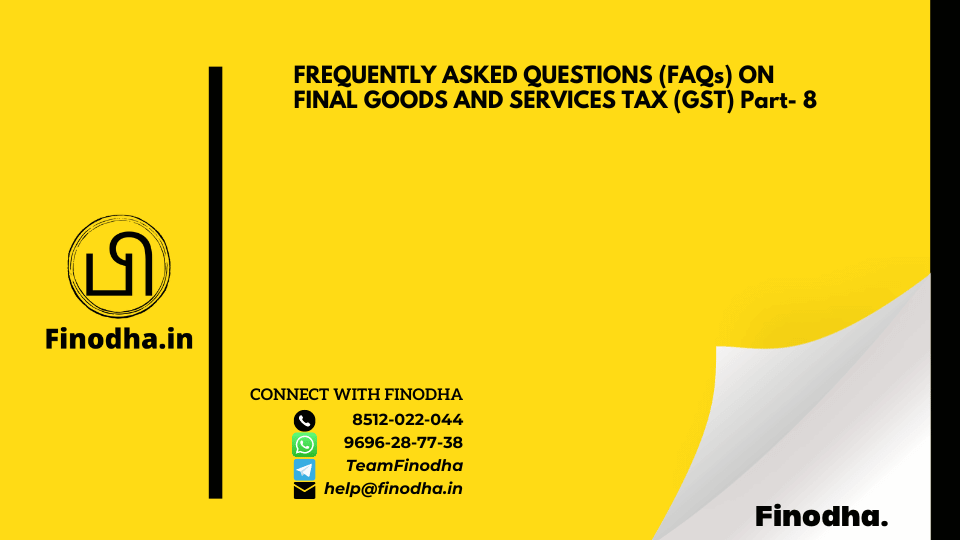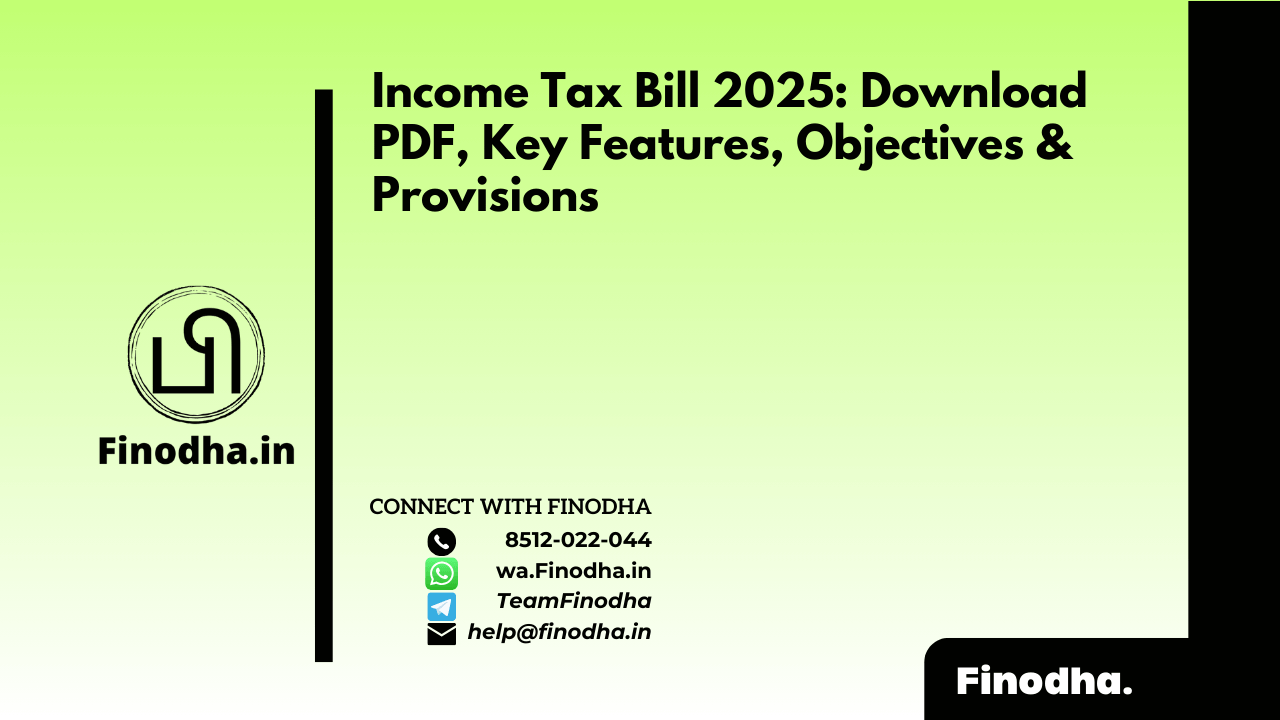Important Keyword: Section 2(44) CGST Act 2017, Section 2(45) CGST Act 2017, Section 52 CGST Act 2017, Notifications No. 52/2018 – Central Tax, Section 24(x) CGST Act 2017, Section 24(ix) CGST Act 2017, Section 9 (5) CGST Act 2017, Notification No. 65/2017 – Central Tax, Section 10(2)(d) CGST Act 2017, Rule 67 CGST Rules 2017, Section 54(1) CGST Act 2017, Section 52(6) CGST Act 2017, Section 12(11) IGST Act 2017, Section 52(12) CGST Act 2017, Section 35 CGST Act 2017, Rules 56 CGST Rules 2017, Rules 58 CGST Rules 2017, Section 2 (44) CGST Act, Section 2 (45) CGST Act, Section 52(1) CGST Act 2017.
3rd Edition: 15th December, 2018
(Note: Changes announced in GST Council meeting held on 22nd December 2018 are being incorporated and the updated edition will be uploaded shortly)
Table of Contents
Contents
- Overview of Goods and Services Tax (GST)
- Levy of and Exemption from Tax
2.1 Composition Levy - Registration
3.1 Amendment of Registration
3.2 Cancellation of Registration - Meaning and Scope of Supply
- Time of Supply
- Valuation in GST
- GST Payment of Tax
7.1 TDS Scheme - Electronic Commerce and Tax Collected at Source
- Job Work
- Input Tax Credit
- Concept of Input Service Distributor in GST
- Returns Process
- Assessment and Audit
13.1 Invoice, Credit and Debit Note
13.2 Accounts and Records under GST
13.3 E Way Bill - Refunds
14.1 Refunds by UINs - Demands and Recovery
- Appeals/Revision
- Advance Ruling
- Inspection, Search, Seizure and Arrest
- Offences, Penalties, Prosecution and Compounding
- Overview of the IGST Act
- Exports and Imports
21.1 Exports
21.2 Export of Services
21.3 Duty Drawback Scheme
21.4 Special Economic Zone(SEZ)
21.5 Export Oriented Units
21.6 Imports - Place of Supply of Goods and Service
22.1 Place of Supply of Goods
22.2 Place of Supply of Services (Location of supplier as well as recipient are in India)
22.3 Place of Supply of Services (Location of supplier or recipient is outside India) - GSTN and Frontend Business Process on GST Portal
- Transitional Provisions
- Anti-profiteering provisions
CENTRAL BOARD OF INDIRECT TAXES & CUSTOMS
NEW DELHI
8. Electronic Commerce and Tax Collected at Source
(The Questions adopted from the Frequently Asked Questions on TCS under GST released by Law Committee, GST Council on 28th September, 2018)
Q 1. What is Electronic Commerce?
Ans. As per Section 2(44) of the CGST Act, 2017, electronic Commerce means the supply of goods or services or both, including digital products over digital or electronic network.
Q 2. Who is an e-commerce operator?
Ans. As per Section 2(45) of the CGST Act, 2017, electronic Commerce operator means any person who owns, operates or manages digital or electronic facility or platform for electronic commerce.
Q 3. What is Tax Collection at Source (TCS)?
Ans. As per Section 52 of the CGST Act, 2017 the e- commerce operator, not being an agent, is required to collect an amount calculated at the rate not exceeding one per cent., as notified by the Government on the recommendations of the Council, of the net value of taxable supplies made through it, where the consideration with respect to such supplies is to be collected by such operator. The amount so collected is called as Tax Collection at Source (TCS).
Q 4. What is the rate of TCS notified by Government?
Ans. Rate of TCS is 0.5% under each Act (i.e. the CGST Act, 2017 and the respective SGST Act / UTGST Act respectively) and the same is 1% under the IGST Act, 2017. Notifications No. 52/2018 – Central Tax and 02/2018-Integrated Tax both dated 20th September 2018 have been issued in this regard. Similar notifications have been issued by the respective State Governments also.
Q 5. Is it mandatory for e-commerce operator to obtain registration?
Ans. Yes. As per section 24(x) of the CGST Act, 2017, every electronic commerce operator has to obtain compulsory registration irrespective of the value of supply made by him. The benefit of threshold exemption is not available to e- commerce operators.
Q 6. Whether a supplier of goods or services supplying through e-commerce operator would be entitled to threshold exemption?
Ans. As per Section 24(ix) of the CGST Act, 2017, every person supplying goods through an e-commerce operator shall be mandatorily required to register irrespective of the value of supply made by him. However, a person supplying services, other than supplier of services under section 9 (5) of the CGST Act, 2017, through an e- commerce platform are exempted from obtaining compulsory registration provided their aggregate turnover does not exceed INR 20 lakhs (or INR 10 lakhs in case of specified special category States) in a financial year. Government has issued the notification No. 65/2017 – Central Tax dated 15th November 2017 in this regard.
Q 7. Whether TCS is required to be collected by e- commerce operators on supply of services by unregistered suppliers through their portal?
Ans. As per Section 24(ix) of the CGST Act, 2017, every person supplying goods or services through an ecommerce operator is mandatorily required to register. However, vide Notification 65/2017-Central Tax dated 15th November 2017 a person supplying services, other than supplier of services under section 9 (5) of the CGST Act, 2017, through an e-commerce platform were exempted from obtaining compulsory registration provided their aggregate turnover does not exceed INR 20 lakhs (or INR 10 lakhs in case of specified special category States) in a financial year. Since such suppliers are not liable for registration, e-commerce operators are not required to collect TCS on supply of services being made by such suppliers through their portal.
Q 8. Whether e-Commerce operator is required to obtain registration in every State/UT in which suppliers listed on their e-commerce platform are located to undertake the necessary compliance as mandated under the law?
Ans. As per the extant law, registration for TCS would be required in each State / UT as the obligation for collecting TCS would be there for every intra-State or inter-State supply. In order to facilitate the obtaining of registration in each State / UT, the e-commerce operator may declare the Head Office as its place of business for obtaining registration in that State / UT where it does not have physical presence. It may be noted that each State/UT has indicated one administrative jurisdiction where all e- commerce operators having business (but not having physical presence) in that State/UT shall register. The proper officer for the purpose of registration of ECOs has also been notified by each State/UT.
Q 9. Foreign e-commerce operator do not have place of business in India since they operate from outside. But their supplier and customers are located in India. So, in this scenario will the TCS provision be applicable to such e-commerce operator and if yes, how will foreign e-commerce operator obtain registration?
Ans. Where registered supplier is supplying goods or services through a foreign e-commerce operator to a customer in India, such foreign e-commerce operator would be liable to collect TCS on such supply and would be required to obtain registration in each State / UT. It may be noted that each State/UT has indicated one administrative jurisdiction where all e-commerce operators having business (but not having physical presence) in that State/UT shall register. The proper officer for the purpose of registration of ECOs has also been notified by each State/UT. If the foreign e-commerce operator does not have physical presence in a particular State / UT, he may appoint an agent on his behalf.
Q 10. Is it necessary for e-Commerce operators who are already registered under GST and have GSTIN, to have separate registration for TCS as well?
Ans. E-Commerce operator has to obtain separate registration for TCS irrespective of the fact whether e- Commerce operator is already registered under GST as a supplier or otherwise and has GSTIN.
Q 11. What is meant by “net value of taxable supplies”?
Ans. The “net value of taxable supplies” means the aggregate value of taxable supplies of goods or services or both, other than the services on which entire tax is payable by the e-commerce operator, made during any month by a registered supplier through such operator reduced by the aggregate value of taxable supplies returned to such supplier during the said month.
Q 12. Whether value of net taxable supplies to be calculated at gross level or at GSTIN level?
Ans. The value of net taxable supplies is calculated at GSTIN level.
Q 13. Is every e-commerce operator required to collect tax on behalf of actual supplier?
Ans. Yes, every e-commerce operator is required to collect tax where the supplier is supplying goods or services through e-commerce operator and consideration with respect to the supply is to be collected by the said e- commerce operator.
Q 14. At what time should the e-commerce operator collect TCS?
Ans. TCS is to be collected once supply has been made through the e-commerce operator and where the business model is that the consideration is to be collected by the e- commerce operator irrespective of the actual collection of the consideration. For example, if the supply has taken place through the e-commerce operator on 30th October, 2018 but the consideration for the same has been collected in the month of November, 2018, then TCS for such supply has to be collected and reported in the statement for the month of October, 2018.
Q 15. Whether TCS to be collected on exempt supplies?
Ans. No, TCS is not required to be collected on exempt supplies.
Q 1 6 . Whether TCS to be collected on supplies on which the recipient is required to pay tax on reverse charge basis?
Ans. No, TCS is not required to be collected on supplies on which the recipient is required to pay tax on reverse charge basis.
Q 17. Whether TCS is to be collected in respect of supplies made by the composition taxpayer?
Ans. As per section 10(2)(d) of the CGST Act, 2017, a composition taxpayer cannot make supplies through e-commerce operator. Thus, question of collecting TCS in respect of supplies made by the composition taxpayer does not arise.
Q 18. Whether TCS is to be collected on import of goods or services or both?
Ans. TCS is not liable to be collected on any supplies on which the recipient is required to pay tax on reverse charge basis. As far as import of goods is concerned since same would fall within the domain of Customs Act, 1962, it would be outside the purview of TCS. Thus, TCS is not liable to be collected on import of goods or services.
Q 19. Is there any exemption on Gold, owing to the fact that rate of GST is only 3% and TCS on it would erode the margin for the seller?
Ans. No such exemption from TCS has been granted.
Q 20. Whether payment of TCS through Input Tax Credit of operator for depositing TCS as per Section 52 (3) of the CGST Act, 2017 is allowed?
Ans. No, payment of TCS is not allowed through Input Tax Credit of e-Commerce operator.
Q 21. It is very common that customers of e- commerce companies return goods. How these sales returns are going to be adjusted?
Ans. An e-commerce company is required to collect tax only on the net value of taxable supplies made through it. In other words, value of the supplies which are returned (supply return) may be adjusted from the aggregate value of taxable supplies made by each supplier (i.e. on GSTIN basis). In other words, if two suppliers “A” and “B” are making supplies through an e-commerce operator, the “net value of taxable supplies” would be calculated separately in respect of “A” and “B”. If the value of returned supplies is more than supplies made on behalf of any of such supplier during any tax period, the same would be ignored in his case.
Q 22. Under Section 52, e-commerce operator collects TCS at the net of returns. Sometimes sales return is more than sales and hence can negative amount be reported?
Ans. Negative amount cannot be declared. There will be no impact in next tax period also. In other words, if returns are more than the supplies made during any tax period, the same would be ignored in current as well as future tax period(s).
Q 23. What is the time within which such TCS is to be remitted by the e-commerce operator to the Government account?
Ans. The amount collected by the operator is to be paid to appropriate government within 10 days after the end of the month in which the said amount was so collected.
Q 24. How can actual suppliers claim credit of TCS?
Ans. The amount of TCS deposited by the operator with the appropriate Government will be reflected in the electronic cash ledger of the actual registered supplier (on whose account such collection has been made) on the basis of the statement filed by the operator in FORM GSTR-8 in terms of Rule 67 of the CGST Rules, 2017. The said credit can be used at the time of discharge of tax liability by the actual supplier.
Q 25. How is TCS to be credited in cash ledger? Whether the refund of such TCS credit lying in the ledger would be allowed at par with the refund provisions contained in section 54(1) of the CGST Act, 2017?
Ans. TCS collected is to be deposited by the e-commerce operator separately under the respective tax head (i.e. Central tax / State tax / Union territory tax / Integrated tax). Based on the statement (FORM GSTR-8) filed by the e- commerce operator, the same would be credited to the electronic cash ledger of the actual supplier in the respective tax head. If the supplier is not able to use the amount lying in the said cash ledger, the actual supplier may claim refund of the excess balance lying in his electronic cash ledger in accordance with the provisions contained in section 54(1) of the CGST Act, 2017.
Q 26. Is the e-commerce operator required to submit any statement? What are the details that are required to be submitted in the statement?
Ans. Yes, every operator is required to furnish a statement, electronically, containing the details of outward supplies of goods or services effected through it, including the supplies of goods or services returned through it, and the amount collected by it as TCS during a month within 10 days after the end of such month in FORM GSTR-8. The operator is also required to file an annual statement by 31st day of December following the end of the financial year in which the tax was collected in FORM GSTR-9B.
Q 27. Whether interest would be applicable on non- collection of TCS?
Ans. As per section 52(6) of the CGST Act, 2017, interest is applicable on omission as well in case of incorrect particulars noticed. In such a case, interest is applicable since it is a case of omission. Further penalty under section 122(vi) of the CGST Act, 2017 would also be leviable.
Q 28. What will be the place of supply for e- commerce operator for recharge of talk time of the Telecom Operator / recharge of DTH / in relation to convenience fee charged from the customers on booking of air tickets, rail tickets supplied through its online platform?
Ans. As per section 12(11) of the IGST Act, 2017, the address on record of the customer with the supplier of services is the place of supply.
Q 29. Under multiple e-commerce model, Customer books a Hotel via ECO-1 who in turn is integrated with ECO-2 who has agreement with the hotelier. In this case, ECO-1 will not have any GST information of the hotelier. Under such circumstances, which e-commerce operator should be liable to collect TCS?
Ans. TCS is to be collected by that e-Commerce operator who is making payment to the supplier for the particular supply happening through it, which is in this case will be ECO-2.
Q 30. Are there any additional powers available to tax officers under this Act?
Ans. As per section 52(12) of the CGST Act, 2017, any authority not below the rank of Deputy Commissioner may serve a notice requiring the operator to furnish the details of their supplies of goods or services or both as well as stock of goods held by the suppliers within 15 working days of the date of service of such notice.
Q 31. Certain e-commerce operators who have been unable to obtain registration in the month of October, 2018 but have already collected TCS for the said month have expressed challenges in relation to the filing of such details in GTSR-8. It has been asked as to how these details are to be furnished on the common portal?
Ans. E-commerce operators, who have been unable to obtain registration in the month of October, 2018 but have already collected TCS for the said month, may furnish the details of TCS collected in the month of October, 2018 in the first return in FORM GTSR-8 to be filed after obtaining registration.
Q 32. We purchase goods from different vendors and are selling them on our website under our own billing. Is TCS required to be collected on such supplies?
Ans. No. According to Section 52 of the CGST Act, 2017, TCS is required to be collected on the net value of taxable supplies made through it by other suppliers where the consideration is to be collected by the ECO. In this case, there are two transactions – where you purchase the goods from the vendors, and where you sell it through your website. For the first transaction, GST is leviable, and will need to be paid by your vendor, on which credit is available for you. The second transaction is a supply on your own account, and not by other suppliers and there is no requirement to collect tax at source. The transaction will attract GST at the prevailing rates.
Q 33. The sellers supplying goods through e- Commerce operators (ECO) may have common places of business, especially if their goods are stored in a shared facility operated by the ECO. This will result in the same additional place of business being registered by multiple suppliers. Is this allowed?
Ans. Yes, this is allowed. Any registered person can declare a premises as a place of business if he has requisite documents for use of the premises as his place of business (like ownership document, agreement with the owner etc.) and there is no restriction about use of a premises by multiple persons. The registered person shall have to comply with the requirements of maintaining records as per section 35 of the CGST Act, 2017 and Rules 56 to 58 of the CGST Rules, 2017.
Q 34. I am a supplier, supplying my own products through a website hosted by me. Do I fall under the definition of an electronic commerce operator. Am I required to collect TCS on such supplies?
Ans. As per the definitions in Section 2 (44) & 2 (45) of the CGST Act, you will come under the definition of an electronic commerce operator. However, according to Section 52 of the Act, ibid, TCS is required to be collected on the net value of taxable supplies made through it by other suppliers where consideration is to be collected by the ECO. In cases where someone is selling their own products through a website, there is no requirement to collect tax at source as per the provisions of this section. These transactions will be liable to GST at the prevailing rates.
Q 35. There are cases where the ECO does not provide invoicing solution to the seller. In such cases, invoice is generated by the seller and received by the buyer without the ECO getting to know about it. The payment flows through the ECO. In such cases, on what value is TCS to be collected? Can TCS be collected on the entire value of the transaction?
Ans. Section 52(1) of the CGST Act, 2017, mandates that TCS is to be collected on the net taxable value of such supplies in respect of which the ECO collects consideration. The amount collected should be duly reported in the GSTR- 8 and remitted to the government. Any such amount collected will be available to the concerned supplier as credit in his electronic cash ledger.
*****
Read More: FREQUENTLY ASKED QUESTIONS (FAQs) ON FINAL GOODS AND SERVICES TAX (GST) Part- 7
Download Pdf: https://gstcouncil.gov.in/sites/default/files/faq/Final-GST-FQ-31218.pdf




